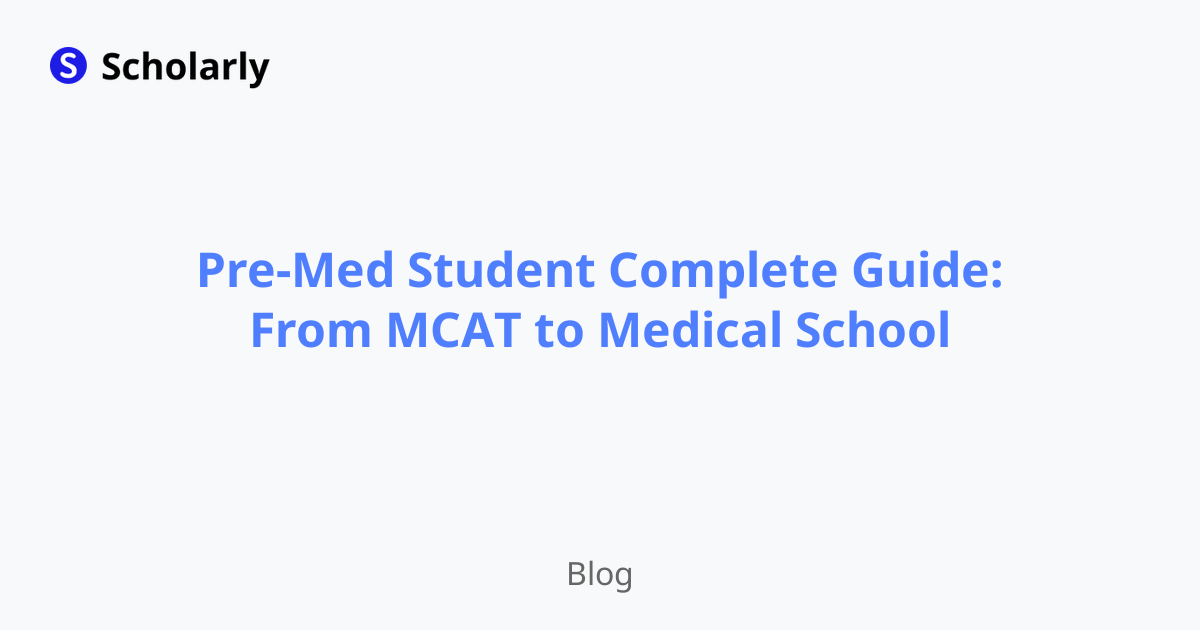Pre-Med Student Complete Guide: From MCAT to Medical School
Master the pre-med journey with comprehensive strategies for coursework, MCAT preparation, clinical experience, and medical school applications.

Introduction
The path to medical school is one of the most competitive and demanding academic journeys, requiring excellence in academics, research, clinical experience, and personal development. With medical school acceptance rates around 40% and top schools accepting less than 5% of applicants, success requires strategic planning from day one of college. This comprehensive guide provides the roadmap that successful pre-med students follow to achieve their medical school dreams.
Methods
1. Academic Excellence Strategies
Core Prerequisite Management:
- Biology sequence: Focus on cell biology, genetics, and physiology
- Chemistry sequence: Master general and organic chemistry thoroughly
- Physics sequence: Understand mechanics, electricity, and magnetism
- Mathematics: Complete calculus and statistics requirements
- English: Develop strong writing and communication skills
GPA Optimization:
- Aim for overall GPA of 3.7+ and science GPA of 3.6+
- Take challenging courses but balance with GPA protection
- Retake courses if necessary to improve grades
- Use grade replacement policies strategically
- Consider post-baccalaureate programs if GPA needs improvement
2. MCAT Preparation Mastery
Long-term Preparation Timeline:
- Begin content review 6-12 months before test date
- Complete full-length practice tests weekly for 3 months
- Focus on weak areas identified through diagnostic testing
- Review content, practice problems, and test-taking strategies
Section-Specific Strategies:
- Chemical and Physical Foundations: Master general chemistry, organic chemistry, and physics
- Critical Analysis and Reasoning: Practice reading comprehension and logical reasoning daily
- Biological and Biochemical Foundations: Focus on biochemistry, biology, and psychology
- Psychological and Social Foundations: Study psychology, sociology, and research methods
3. Clinical Experience Development
Direct Patient Care:
- Volunteer at hospitals, clinics, or nursing homes
- Gain experience through EMT, CNA, or medical scribe positions
- Participate in medical mission trips or community health programs
- Document hours and reflect on meaningful patient interactions
Clinical Exposure:
- Shadow physicians in multiple specialties
- Observe surgical procedures and clinical rounds
- Understand different healthcare settings and roles
- Build relationships with physician mentors
4. Research Experience Building
Finding Research Opportunities:
- Approach faculty members about ongoing research projects
- Apply for summer research programs (REU, SURF)
- Consider independent research projects with faculty mentorship
- Participate in research conferences and presentations
Maximizing Research Impact:
- Aim for publications or poster presentations
- Understand research methodology and data analysis
- Develop hypothesis generation and experimental design skills
- Learn to communicate research findings effectively
5. Leadership and Service
Meaningful Volunteer Commitment:
- Choose causes aligned with your values and interests
- Demonstrate long-term commitment rather than resume padding
- Take on leadership roles within organizations
- Focus on impact and personal growth from service
Leadership Development:
- Hold officer positions in pre-med or academic organizations
- Start initiatives or programs that benefit others
- Mentor younger pre-med students
- Demonstrate teamwork and collaboration skills
6. Application Strategy
School Selection:
- Apply to 15-25 schools with varied competitiveness levels
- Research each school's mission, curriculum, and culture
- Consider state residency preferences and tuition costs
- Include safety, target, and reach schools
Personal Statement Excellence:
- Tell a compelling story about your motivation for medicine
- Demonstrate understanding of medicine as a profession
- Highlight unique experiences and perspectives
- Show personal growth and maturity
Interview Preparation:
- Practice common interview questions and scenarios
- Develop compelling stories that demonstrate your qualities
- Understand current healthcare issues and medical ethics
- Prepare thoughtful questions about each school
Benefits
- Intellectual Challenge: Pre-med coursework develops critical thinking and problem-solving skills
- Service Opportunity: Medicine provides meaningful career focused on helping others
- Professional Status: Medical degree opens doors to respected and well-compensated careers
- Diverse Specializations: Multiple medical specialties allow for varied career paths
Challenges
- Intense Competition: Medical school admission is highly competitive with many qualified applicants
- Academic Rigor: Pre-med coursework is demanding and requires excellent time management
- Financial Investment: Medical education is expensive with significant student loan debt
- Time Commitment: Path to practicing medicine requires 7-11 years of post-undergraduate training
Conclusion
Success as a pre-med student requires strategic planning, academic excellence, meaningful experiences, and personal growth. Start early, stay focused on your motivation for medicine, and remember that the journey itself develops the skills and character needed to be an excellent physician. The challenges you overcome on the pre-med path prepare you for the rigors and rewards of medical practice.
Try Our Popular AI Study Tools
Transform your study materials into interactive learning experiences with our most popular AI-powered tools:
PDF to Flashcards
Convert lecture notes and textbooks into study flashcards instantly
Text to Flashcards
Turn any text or notes into comprehensive flashcard sets
Image to Flashcards
Convert diagrams and handwritten notes into digital flashcards
YouTube to Flashcards
Generate flashcards from educational video content



